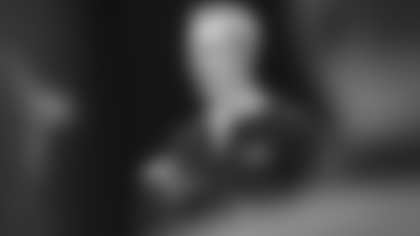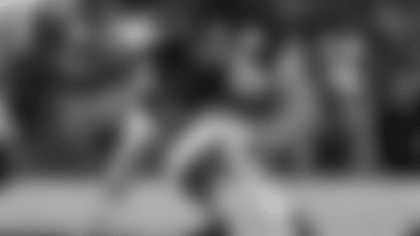David Harris during a Michigan game
David Harris is often on the move inside the Atlantic Health Jets Training Center and hard to pin down. The inside linebacker, in his second season out of Michigan, might avoid the spotlight but he quietly continues to be a solid force.
After five games, Harris' 41 tackles pace the Jets. The Green & White have five players with at least 20 stops, but no one is in the 30s. When asked about his performance, Harris prefers to speak about the unit.
"I think we're doing extremely well," he said today in a hallway outside of the Jets' locker room. "We made it an emphasis to play better on defense, stop the run and eliminate the big plays. We're headed in the right direction, but we still have a ways to go."
A defense that finished 29th against the run last season is now ranked third after five games. The Jets are allowing only 69 yards a game and their last two opponents, Cincinnati and Arizona, combined to rush for just 85 yards.
"It's due to everybody's hard work and dedication. Everyone knew that we were pretty bad against the run last year and this year we made a pact to play our technique and be where you're supposed to be," Harris said. "Just do your job. And that's been working so far."
The view Harris has of developing plays has become less obstructed with Kris Jenkins manning the vital nose position. The 6'4", 349-pound Jenkins is the anchor of the Jets' three-man line and is playing at an All-Pro level.
"He's a great, great player up front. He demands a double-team," Harris said. "When he is single-blocked, he destroys plays singlehandedly. Me and Eric Barton love playing behind him. He's a man."
Those opposition guards can't engage with the Jets' inside 'backers too fast, otherwise they'll be leaving a poor center alone with Jenkins. So how will the Raiders choose to play this weekend — leave C Jake Grove alone with Jenkins or give him some help and create space for Harris and company?
"They are one of the top teams in the league running the ball. They have three good running backs in Darren McFadden, Michael Bush and Justin Vargas, so it's a three-headed monster," Harris said. "They're very physical up front and that's what they try to do. We have a fight on our hands and we're looking forward to the challenge."
The Raiders average a healthy 4.6 yards per carry. McFadden, who was bothered by a turf toe injury, is back practicing fully and the Raiders will look to get him the football early and often.
McFadden, selected No. 4 overall out of Arkansas, has averaged 5.1 yards per carry and has game-breaking ability. The Jets will have to prepare for him from a natural backfield position, taking shotgun snaps and even lining up at wide receiver.
"He can break a long run pretty much anytime he touches the ball," Harris said. "Him and Vargas, they're both pretty quick. Bush is a powerful guy and is more of an inside runner, a short-yardage runner."
If the Jets can stop the Raiders' ground assault, then Oakland will be forced out of its comfort zone. JaMarcus Russell, a 6'6", 260-pounder, has an unbelievable arm but he's only completing 50 percent of his passes.
"He can make all the throws on the field," Harris said. "You have to defend the whole field against him because he can throw it 80 yards with a flick of the wrist."
A defensive quarterback in his second season, Harris is now able to listen to play calls via radio and then relay those commands to his teammates. The Jets still use hand signals, but Harris hears an instruction after every down.
"It helps us get the plays in a lot quicker," he said. "But sometimes it doesn't work, so you still have to know the hand signals if there is a technical failure. It's worked out tremendously. It just cuts down that whole process of relaying signals and makes it that much easier to get lined up and communicate on the field."
Not one to waste words, Harris still does most of his talking on the field.















